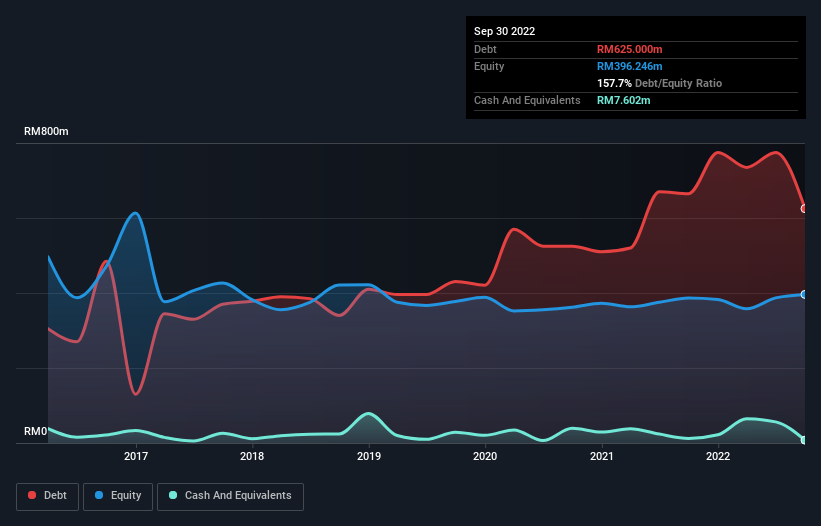We Think British American Tobacco (Malaysia) Berhad (KLSE:BAT) Can Stay On Top Of Its Debt

The external fund manager backed by Berkshire Hathaway's Charlie Munger, Li Lu, makes no bones about it when he says 'The biggest investment risk is not the volatility of prices, but whether you will suffer a permanent loss of capital.' It's only natural to consider a company's balance sheet when you examine how risky it is, since debt is often involved when a business collapses. We can see that British American Tobacco (Malaysia) Berhad (KLSE:BAT) does use debt in its business. But is this debt a concern to shareholders?
When Is Debt A Problem?
Debt and other liabilities become risky for a business when it cannot easily fulfill those obligations, either with free cash flow or by raising capital at an attractive price. In the worst case scenario, a company can go bankrupt if it cannot pay its creditors. However, a more frequent (but still costly) occurrence is where a company must issue shares at bargain-basement prices, permanently diluting shareholders, just to shore up its balance sheet. Of course, the upside of debt is that it often represents cheap capital, especially when it replaces dilution in a company with the ability to reinvest at high rates of return. When we examine debt levels, we first consider both cash and debt levels, together.
View our latest analysis for British American Tobacco (Malaysia) Berhad
What Is British American Tobacco (Malaysia) Berhad's Net Debt?
The image below, which you can click on for greater detail, shows that British American Tobacco (Malaysia) Berhad had debt of RM625.0m at the end of September 2022, a reduction from RM665.0m over a year. And it doesn't have much cash, so its net debt is about the same.

How Healthy Is British American Tobacco (Malaysia) Berhad's Balance Sheet?
According to the last reported balance sheet, British American Tobacco (Malaysia) Berhad had liabilities of RM815.7m due within 12 months, and liabilities of RM22.5m due beyond 12 months. On the other hand, it had cash of RM7.60m and RM626.7m worth of receivables due within a year. So it has liabilities totalling RM203.9m more than its cash and near-term receivables, combined.
Of course, British American Tobacco (Malaysia) Berhad has a market capitalization of RM3.73b, so these liabilities are probably manageable. Having said that, it's clear that we should continue to monitor its balance sheet, lest it change for the worse.
We use two main ratios to inform us about debt levels relative to earnings. The first is net debt divided by earnings before interest, tax, depreciation, and amortization (EBITDA), while the second is how many times its earnings before interest and tax (EBIT) covers its interest expense (or its interest cover, for short). This way, we consider both the absolute quantum of the debt, as well as the interest rates paid on it.
British American Tobacco (Malaysia) Berhad has a low net debt to EBITDA ratio of only 1.5. And its EBIT easily covers its interest expense, being 20.8 times the size. So we're pretty relaxed about its super-conservative use of debt. The good news is that British American Tobacco (Malaysia) Berhad has increased its EBIT by 2.8% over twelve months, which should ease any concerns about debt repayment. The balance sheet is clearly the area to focus on when you are analysing debt. But it is future earnings, more than anything, that will determine British American Tobacco (Malaysia) Berhad's ability to maintain a healthy balance sheet going forward. So if you're focused on the future you can check out this free report showing analyst profit forecasts.
Finally, a business needs free cash flow to pay off debt; accounting profits just don't cut it. So the logical step is to look at the proportion of that EBIT that is matched by actual free cash flow. Over the most recent three years, British American Tobacco (Malaysia) Berhad recorded free cash flow worth 55% of its EBIT, which is around normal, given free cash flow excludes interest and tax. This free cash flow puts the company in a good position to pay down debt, when appropriate.
Our View
British American Tobacco (Malaysia) Berhad's interest cover suggests it can handle its debt as easily as Cristiano Ronaldo could score a goal against an under 14's goalkeeper. And its conversion of EBIT to free cash flow is good too. When we consider the range of factors above, it looks like British American Tobacco (Malaysia) Berhad is pretty sensible with its use of debt. That means they are taking on a bit more risk, in the hope of boosting shareholder returns. The balance sheet is clearly the area to focus on when you are analysing debt. However, not all investment risk resides within the balance sheet - far from it. Be aware that British American Tobacco (Malaysia) Berhad is showing 2 warning signs in our investment analysis , you should know about...
When all is said and done, sometimes its easier to focus on companies that don't even need debt. Readers can access a list of growth stocks with zero net debt 100% free, right now.
Valuation is complex, but we're here to simplify it.
Discover if British American Tobacco (Malaysia) Berhad might be undervalued or overvalued with our detailed analysis, featuring fair value estimates, potential risks, dividends, insider trades, and its financial condition.
Access Free AnalysisHave feedback on this article? Concerned about the content? Get in touch with us directly. Alternatively, email editorial-team (at) simplywallst.com.
This article by Simply Wall St is general in nature. We provide commentary based on historical data and analyst forecasts only using an unbiased methodology and our articles are not intended to be financial advice. It does not constitute a recommendation to buy or sell any stock, and does not take account of your objectives, or your financial situation. We aim to bring you long-term focused analysis driven by fundamental data. Note that our analysis may not factor in the latest price-sensitive company announcements or qualitative material. Simply Wall St has no position in any stocks mentioned.
About KLSE:BAT
British American Tobacco (Malaysia) Berhad
Engages in the manufacture, sale, marketing and importation of cigarettes, pipe tobaccos, cigars, devices, other tobacco products, and nicotine products in Malaysia.
Undervalued with mediocre balance sheet.
Similar Companies
Market Insights
Community Narratives



